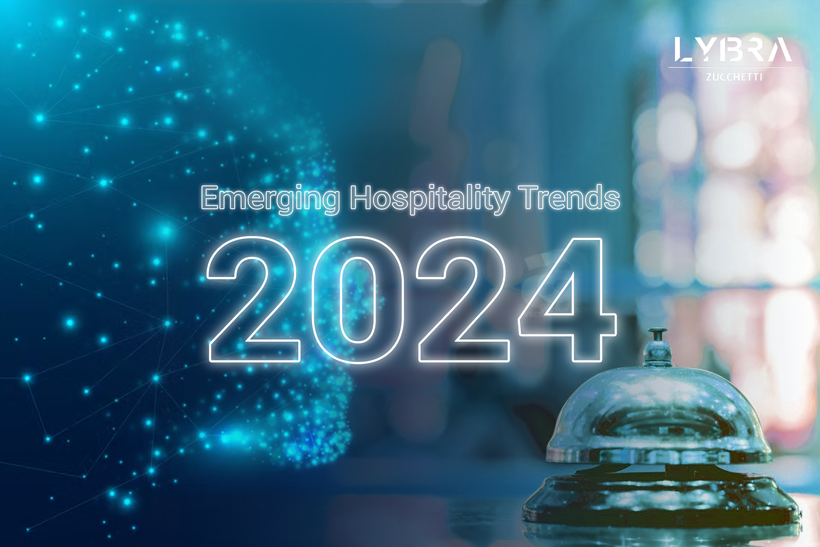As we bid farewell to 2023, the hospitality industry stands on the brink of a transformative year. The past few years have been a rollercoaster, with unprecedented challenges reshaping the way hotels operate. However, with challenges come opportunities, and 2024 promises to be a year of innovative trends that will redefine the hospitality landscape. Here are the key trends hotel owners and managers should watch out for:
1. Personalized Guest Experiences Through Big Data:
As we enter 2024, the use of big data in hospitality is taking personalization to new heights. Big data allows hotels to gather and analyze vast amounts of guest information, from demographic details to behavioral insights. This data, sourced from past bookings, online interactions, and even social media activities, enables hotels to understand and anticipate guest preferences in unparalleled ways.
By leveraging this wealth of information, hotels can tailor experiences to individual needs. For example, guest rooms can be pre-set to preferred temperatures and equipped with amenities based on past preferences, ensuring a personalized welcome. Moreover, predictive models can forecast guests’ future needs, like a preference for quieter rooms or special arrangements for occasions.
In-room technology also benefits from this trend, offering content in guests’ native languages or suggesting activities aligned with their interests. Personalization extends to marketing, where targeted communication based on guest segments enhances engagement and deepens guest relationships.
In essence, big data in 2024 is not just a technological tool; it’s the key to creating guest-centric experiences that celebrate individuality and foster loyalty. This trend signifies a shift towards a more personalized, intuitive, and memorable approach in hospitality, making each stay uniquely special.
2. Sustainability as a Core Business Strategy:
In 2024, sustainability will be transcending beyond a mere trend and becoming an integral part of the hospitality industry’s business strategy. This shift is driven by an increasing awareness among guests about environmental issues and their desire to engage with brands that demonstrate genuine commitment to sustainability. Hotels are responding by embedding eco-friendly practices into their core operations, which not only reduces their environmental impact but also appeals to a growing demographic of eco-conscious travelers.
Hotels are adopting sustainable practices in various ways, from utilizing renewable energy sources and implementing water-saving technologies to reducing waste and using eco-friendly materials in construction and renovations. Additionally, many are sourcing locally produced food and products, which not only supports local communities but also reduces carbon footprint associated with transportation.
Moreover, sustainability efforts extend to guest experiences. Hotels are offering programs that allow guests to participate in eco-friendly activities, such as beach clean-ups or tree planting initiatives. This not only enhances the guest experience but also raises awareness and encourages sustainable practices among travelers.
By making sustainability a core business strategy, hotels are not just contributing to environmental conservation but also positioning themselves favorably in a market where guests increasingly make choices based on sustainability credentials. This approach represents a win-win for the environment and the hospitality industry, marking a significant step towards a more sustainable future.
3. The Rise of Smart Room Technology:
Looking ahead to 2024, the hospitality industry is poised to embrace a significant increase in smart room technology, revolutionizing the guest experience. This emerging trend, aimed at enhancing guest comfort while optimizing operational efficiency, is set to become a defining feature in modern hotels. Smart rooms, equipped with cutting-edge technology, are expected to respond intuitively to guests’ needs, offering unprecedented convenience and personalization.
A key element of this upcoming trend is the integration of voice-activated controls, allowing guests to manage room settings such as lighting, temperature, and entertainment systems through simple voice commands. This advancement promises a seamless and highly modern room experience. Additionally, automated systems are anticipated to adjust settings based on learned guest preferences and behaviors, like lowering lights at bedtime or modulating the room temperature in response to external weather conditions.
Furthermore, the incorporation of AI-driven amenities, including virtual concierges, is on the horizon. These amenities are designed to offer personalized recommendations for dining and activities, enhancing the guest experience with convenience and tailored options.
The adoption of smart technology in hotel rooms in 2024 is expected to transcend traditional luxury; it’s about creating an environment that anticipates and satisfies guest needs in the most efficient and subtle manner. This impending trend signifies a major leap in guest services, establishing a new benchmark for comfort and convenience in the hospitality sector.
4. The Emergence of AI in Revenue Management:
As we look towards 2024, the role of Artificial Intelligence (AI) in revenue management in the hospitality industry is set to become increasingly prominent. This technological advancement is reshaping how hotels optimize pricing, forecast demand, and maximize revenue potential. AI’s ability to analyze vast datasets and identify patterns offers unparalleled precision in making revenue-related decisions, a crucial factor in the highly competitive hotel industry.
AI systems in revenue management are designed to process and analyze data from multiple sources, including past booking trends, market dynamics, competitor pricing, and even local events. This comprehensive analysis enables hotels to set dynamic pricing strategies that adapt to real-time market conditions. Such data-driven pricing ensures that hotels remain competitive while maximizing revenue opportunities.
Furthermore, AI’s predictive capabilities are essential for demand forecasting. By analyzing trends and external factors, AI can accurately predict periods of high and low demand, allowing hotels to adjust their strategies accordingly. This foresight is invaluable for inventory management and marketing efforts, ensuring that hotels are well-prepared for future market fluctuations.
In 2024, the emergence of AI in revenue management is not just about automation; it’s about strategic decision-making backed by data. This trend marks a significant evolution in the hospitality industry, empowering hotels to make more informed, efficient, and profitable decisions.
5. The Growth of Bleisure Travel:
Heading into 2024, the concept of ‘bleisure’ travel, a blend of business and leisure, is expected to experience significant growth. This evolving trend reflects a shift in travel behavior, where more individuals are extending business trips to include leisure activities. Hotels are preparing to cater to this unique segment, combining the facilities and services needed for both work and relaxation in a seamless experience.
As bleisure travelers often seek a balance between work commitments and personal enjoyment, hotels are adapting their offerings to meet these dual needs. This includes flexible workspaces equipped with high-speed internet and meeting facilities, alongside amenities like fitness centers, spas, and recreational activities. The aim is to create an environment where guests can effortlessly transition between productive work sessions and relaxing downtime.
Moreover, hotels are tailoring their services to accommodate the schedules of bleisure travelers. This could include offering extended room service hours, organizing local tours that fit around business hours, and providing transportation services that facilitate easy exploration of the destination.
In 2024, the growth of bleisure travel is set to reshape hotel offerings, merging the distinct needs of business and leisure into a cohesive experience. This trend highlights the industry’s adaptability and commitment to providing diverse, flexible, and enriching travel experiences for every type of traveler.
6. Focus on Health and Wellness:
As we approach 2024, the focus on health and wellness in the hospitality industry is becoming increasingly paramount. This trend, driven by a growing global emphasis on holistic well-being, is leading hotels to expand and enhance their wellness offerings. The aim is to cater not just to the physical health of guests but also to their mental and emotional well-being.
Hotels are expected to invest in comprehensive wellness programs that encompass a range of activities and facilities. These include state-of-the-art fitness centers, yoga and meditation classes, wellness retreats, and spa services offering therapeutic treatments. The objective is to provide guests with opportunities to maintain their health routines and to encourage relaxation and rejuvenation.
Moreover, the culinary aspect of wellness is also gaining prominence. Hotels are increasingly featuring menus with healthy, nutritious options, often incorporating organic and locally sourced ingredients. Special dietary requirements, such as gluten-free, vegan, or vegetarian diets, are being catered to with a wider variety of choices, reflecting a commitment to inclusive wellness.
In 2024, the health and wellness trend is expected to be a key differentiator in the hospitality industry. By offering diverse and holistic wellness options, hotels are not only enhancing the guest experience but also contributing positively to the overall well-being of their clients. This focus is a testament to the industry’s recognition of the evolving needs and preferences of modern travelers.
7. Enhanced Digital Integration:
Looking towards 2024, the hospitality industry is gearing up for an enhanced level of digital integration in its operations and guest services. This progression is driven by the growing demand for seamless, tech-driven experiences by modern travelers. Hotels are set to adopt a range of digital solutions that not only streamline operations but also significantly elevate the guest experience.
A key aspect of this digital shift is the adoption of mobile check-in and digital key technology, allowing guests to bypass traditional front-desk procedures for a more efficient and contactless arrival experience. This technology extends to in-room services, where guests can use their smartphones or in-room tablets to control room settings, order room service, or request housekeeping.
Additionally, hotels are looking to integrate Virtual Reality (VR) tours of their properties. These VR experiences enable potential guests to virtually explore rooms, amenities, and facilities, aiding in their decision-making process.
Furthermore, Artificial Intelligence (AI) is being employed to personalize guest interactions, with chatbots providing instant responses to inquiries and requests. This not only enhances guest convenience but also optimizes staff efficiency by handling routine queries.
The enhanced digital integration set for 2024 represents a significant leap in how hotels operate and interact with their guests. By embracing these technologies, hotels are not only keeping up with the digital age but are also offering a more personalized, convenient, and innovative experience to their guests.
8. Experiential Travel:
As we move into 2024, experiential travel is expected to continue its rise as a dominant trend in the hospitality industry. This trend focuses on providing guests with unique, authentic experiences that go beyond traditional sightseeing, delving into the culture, history, and essence of the destination. Hotels are increasingly recognizing the value of offering immersive experiences that connect guests with the local environment and community.
Hotels are preparing to cater to this demand by curating experiences that are not just about relaxation but also about engagement and learning. This could include organizing local tours that offer insights into the area’s history and culture, culinary classes featuring regional cuisine, or outdoor adventures that showcase the natural beauty of the location. These activities are designed to provide guests with a deeper, more meaningful connection to the destination.
Moreover, hotels are collaborating with local artisans, chefs, and guides to create these experiences, which not only enriches the guest’s stay but also supports the local economy and promotes cultural exchange.
The emphasis on experiential travel in 2024 reflects a broader shift in consumer preferences, where travelers are seeking more than just a place to stay. They are looking for memorable, engaging experiences that provide a sense of place and a deeper understanding of their destination. This trend is reshaping the hospitality industry, encouraging hotels to become gateways to unique, local experiences.
9. Increased Use of Contactless Services:
Heading into 2024, the hospitality industry is embracing an increased use of contactless services, a trend accelerated by recent global events and evolving guest preferences. This shift towards touchless interactions is focused on enhancing guest safety and convenience, meeting the demands of a world increasingly accustomed to digital solutions.
Hotels are set to implement a variety of contactless features. Key among these is contactless payment systems, allowing guests to complete transactions securely and swiftly without physical contact. This technology extends to other areas, such as digital menus in restaurants and QR codes for accessing hotel services and information.
Another significant aspect is the use of digital communication channels for guest interaction. Hotels are adopting apps and chatbots for guests to make requests, book services, or communicate with hotel staff, all without direct face-to-face interaction. This approach not only minimizes physical contact but also offers guests the convenience of managing their stay through their own devices.
Moreover, the use of touchless technology in guest rooms, such as voice-activated controls for lighting, temperature, and entertainment, is becoming more common. This enhances the guest experience by providing a high-tech, personalized environment.
The increased use of contactless services in 2024 signifies the hospitality industry’s commitment to adapting to new norms and leveraging technology to ensure guest safety, comfort, and satisfaction. This trend is a clear response to the evolving expectations of travelers in a digital-first world.
10. Strategic Use of Social Media:
As we approach 2024, the strategic use of social media in the hospitality industry is anticipated to reach new levels of importance and sophistication. Recognizing the immense power of these platforms in shaping consumer perceptions and decisions, hotels are focusing on leveraging social media not just as a marketing tool, but as a comprehensive channel for guest engagement, reputation management, and direct bookings.
Hotels are expected to employ targeted social media strategies to connect with different guest demographics, using visually compelling content and storytelling to showcase their unique offerings and experiences. This includes sharing behind-the-scenes glimpses, guest testimonials, and immersive videos that bring the hotel’s ambiance and services to life. The goal is to create an engaging narrative that resonates with potential guests and encourages them to experience the hotel first-hand.
Additionally, hotels are using social media to gather guest feedback and address concerns in real-time, enhancing their reputation for responsive and personalized service. Influencer partnerships and social media campaigns are also becoming integral, driving brand awareness and direct bookings through influential endorsements and targeted promotions.
The strategic use of social media in 2024 is set to become a critical component of hotel operations, transforming how they connect with guests, manage their brand image, and drive revenue. This trend highlights the evolving role of digital platforms in the hospitality industry, emphasizing the need for hotels to be dynamic and engaging in their online presence.
The bottom line
The year 2024 is set to be a landmark year for the hospitality industry. The trends outlined above not only signify changes but also opportunities for growth and innovation. As hoteliers, staying abreast of these trends and adapting your strategies accordingly will be key to thriving in this ever-evolving industry.
At Lybra Tech, we are committed to providing innovative solutions, like Lybra Assistant RMS, that empower hotels to navigate some of these trends effectively. Our focus on leveraging big data and AI ensures that our partners are always at the forefront of technological advancements in revenue management.
While we are passionate about helping hotels increase revenue and grow through innovative solutions, we also recognize the importance of environmental responsibility. That’s why we are actively involved in environmental conservation efforts through Treedom tree planting initiatives. We believe that it’s crucial to not only support the business growth of hotels but also to conscientiously offset the carbon emissions associated with this growth. Our commitment to sustainability reflects our belief in a balanced approach to progress, where economic success and environmental preservation go hand in hand.
We wish all hoteliers a prosperous and innovative 2024. Let’s embrace the future of hospitality together!










